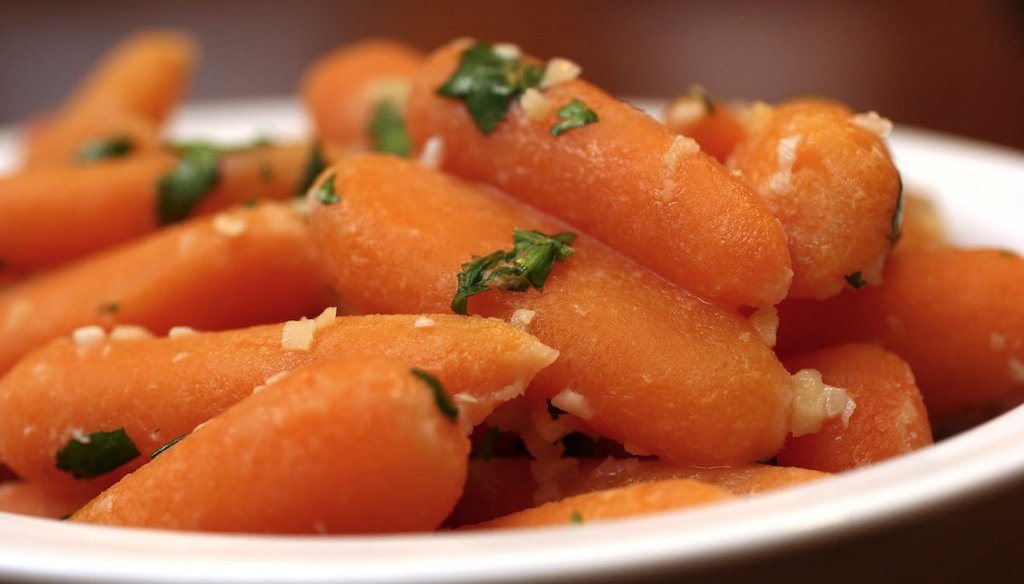

Our only agenda is to publish the truth so you can be an informed participant in democracy.
We need your help.


A dish of cooked baby carrots is served, Jan. 22, 2008. Despite claims, baby carrots do not cause cancer. (AP)
Baby carrots may be best enjoyed with ranch dressing. But according to a Facebook post, they’ve been dipped in something far more deadly.
In a video posted to Facebook, nutritional consultant Louis Smith said baby carrots are soaked in bleach, and therefore linked to cancer.
"Did you know that little baby carrots aren't baby carrots? They're normally fully grown carrots shaped to look like a baby carrot, and then soaked in bleach or some kind of chemical to increase their shelf life from 24 hours to about eight or nine months, and that chemical could really aggravate cancer and harm your body," Smith said.
The video was flagged as part of Facebook’s efforts to combat false news and misinformation on its News Feed. (Read more about our partnership with Facebook.)
Smith, who is described on his LinkedIn profile as a nutritional consultant and entrepreneur, has a large following on Facebook and other social media platforms. However, his business page gives the caveat that the statements from his company "have not been approved by the Food and Drug Administration," and "are not intended to diagnose, treat, cure or prevent any disease."
We reached out to Smith to ask for more information, but did not receive a response. He’s partly correct in saying that baby carrots are made from longer carrots, and, as is the case with many vegetables sold commercially, are subjected to a highly diluted wash in bleach and chlorine. But the claim that they are "soaked" in bleach and are tied to cancer takes things a few steps too far. Overall, these carrots are safe to consume.
Soohyoun Ahn, a lecturer in food science and human nutrition at the University of Florida and founder of the Florida Food Entrepreneurship, a program that helps provide beginning and established food entrepreneurs with information needed to run their businesses, confirmed that baby carrots come from longer ones. Thin carrots are harvested separately, she said, and then cut down and shaped into baby ones.
"It is just a processing, and there is no harm in cutting and shaping. And carrots that (the) baby carrots are made of are thin ones, so it is very likely they would not be sold as regular carrots in the market anyway," Ahn said. "So, I personally believe this is a great way to use foods without creating any waste."
The baby carrots soaked in chemicals rumor is one that’s gone around before — Snopes fact-checked it in 2008 and the website Have A Plant, run by the nonprofit organization Produce For Better Health Foundation, published an article. Both groups said baby carrots do get a wash in a diluted chlorine bleach solution, but that it evaporates quickly and the carrots are rinsed.
"The amount of chlorine used is similar to that in public drinking water and poses no health risk," Have A Plant wrote.
Ahn said this type of washing isn’t just limited to carrots. Many vegetables get this type of cleaning, she said.
"Many vegetables (especially those that are ready to eat or packaged as prewashed) are washed with chlorinated (bleach) water for sanitization," Ahn wrote to us, explaining that the concentration of bleach is strictly kept under federal regulations. "As long as the bleach solution concentration is under the limit set by the regulation, using bleach solution to sanitize raw vegetable is perfectly legal."
Many fresh produce have microorganisms on their surfaces when they’re harvested, Ahn said. Even though the fruits and vegetables have been processed and rinsed with a diluted bleach solution, it’s good to rinse them again after buying them to make sure there is no bleach on the surface.
"This is why consumers must wash their fruits and vegetables before consumption!" she told us. "So sanitizing them (especially if they will be processed into a product — such as salad mix, precut carrots etc.) is critical for food safety reasons."
In 2021, baby carrots were recalled for safety reasons. But not because they had been oversanitized — it was because of salmonella contamination, something that "again clearly shows the importance of sanitizing raw vegetables!" said Ahn.
Carrots are a good source of beta carotene, fiber, vitamin K1, potassium and carotenoids, which the Cleveland Clinic describes as an antioxidant pigment that "may help protect against prostate, colon and stomach cancer."
A Facebook video said baby carrots are soaked in bleach and can cause cancer.
A nutritional expert said baby carrots are shaped from longer, thinner carrots that are unlikely to be sold as is on the market. They are washed in a diluted solution with bleach, but are rinsed off. The solution is safe under federal regulations, and is no more harmful than the chlorine solution in tap water.
We rate this claim False.
Facebook post, July 23, 2022
Snopes, How Are Baby Carrots Made? March 11, 2008
Have a Plant, Do Baby Carrots Get Processed With Chlorinated Water and Does Cooking Affect Vitamin Content? Accessed July 28, 2022
U.S. Food and Drug Administration, CFR - Code of Federal Regulations Title 21, March 29, 2022
KARE 11, Packaged carrots recalled due to potential Salmonella contamination, July 23, 2021
Healthline, Carrots 101: Nutrition Facts and Health Benefits, May 3, 2019
Medical News Today, What are the health benefits of carrots? Feb. 28, 2022
Cleveland Clinic, Reasons why carrots (of all colors) are healthy for you, March 23, 2021
Email interview with Soohyoun Ahn, lecturer in food science and human nutrition at the University of Florida and founder of the Florida Food Entrepreneurship, July 28, 2022
In a world of wild talk and fake news, help us stand up for the facts.
